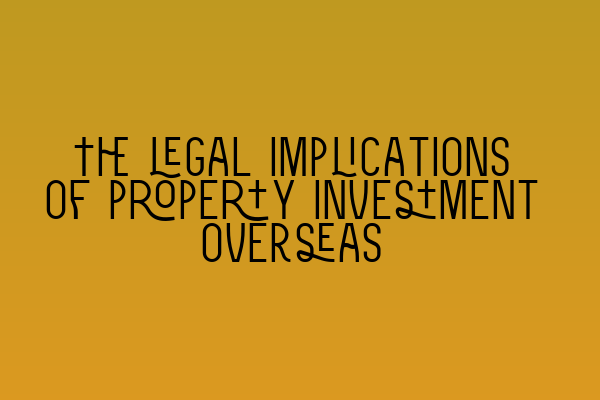The Legal Implications of Property Investment Overseas
Investing in property can be a lucrative endeavor, providing individuals with an opportunity to diversify their portfolio and potentially earn significant returns. While many investors primarily focus on domestic opportunities, an increasing number are turning their attention to property investment overseas. Investing in foreign real estate can offer attractive advantages such as lower prices, potential for high rental income, and access to emerging markets. However, it is crucial to be aware of the legal implications involved in such investments to ensure a smooth and successful venture.
Title: Understanding the Legal Landscape
1. Researching Local Laws and Regulations:
Before considering property investments overseas, it is essential to have a thorough understanding of the local laws and regulations governing real estate transactions in the respective country. These laws vary significantly from one jurisdiction to another and can impact various aspects of the investment process, including property ownership rights, tax obligations, and leasing agreements. Engaging the services of a local solicitor who specializes in property law can provide valuable insights into the legal intricacies involved.
2. Compliance with Foreign Ownership Restrictions:
Many countries have restrictions on foreign ownership of real estate, particularly on specific property types such as agricultural land or properties located near strategic areas. Investors must ensure their intended investment complies with these restrictions to avoid legal complications down the line. This may involve obtaining permits, licenses, or complying with specific requirements set by the local authorities. Seeking guidance from an experienced solicitor well-versed in foreign property ownership regulations is advantageous to navigate these complexities effectively.
3. Understanding Tax Obligations:
Taxation is a critical aspect of property investment overseas. Investors must familiarize themselves with the tax laws and obligations in the country they wish to invest in. This includes understanding local taxes, such as property taxes, capital gains tax, and rental income tax, as well as any applicable tax treaties between the investor’s home country and the foreign jurisdiction. Consulting with a tax expert can help ensure compliance and minimize potential tax liabilities.
4. Mitigating Currency Risks:
Investing in a foreign country involves exposure to currency exchange risks. Fluctuations in exchange rates can significantly impact the returns on investment. It is crucial to consider currency hedging strategies and exchange rate volatility when planning an overseas property investment. Working with professionals familiar with foreign exchange markets can help investors minimize potential losses and maximize their investment returns.
5. Dealing with Disputes and Legal Remedies:
Investing in any property carries inherent risks of disputes and legal challenges. Unfortunately, when investing overseas, the complexity of dealing with disputes can increase. Understanding the local legal system, including dispute resolution mechanisms such as arbitration or litigation, is crucial for investors to protect their interests. Engaging a solicitor proficient in property law and well-versed in the local jurisdiction can provide necessary guidance and support in case of legal disputes.
Conclusion:
Investing in property overseas can be a lucrative opportunity, but it requires careful consideration of the legal implications involved. From understanding local laws and regulations to complying with foreign ownership restrictions and mitigating currency risks, investors must navigate a complex landscape to ensure a successful investment venture. Working closely with experienced solicitors who specialize in property law and have an in-depth understanding of the foreign jurisdiction can provide invaluable support and guidance throughout the process.
For more information on related topics, check out these articles:
– SQE 1 Practice Exam Questions
– SQE 1 Practice Mocks FLK1 FLK2
– SQE 2 Preparation Courses
– SQE 1 Preparation Courses
– SRA SQE Exam Dates
Remember, investing in property overseas can be a rewarding venture, but it is essential to approach it with caution, knowledge, and the support of legal experts to ensure a smooth and successful investment journey.
